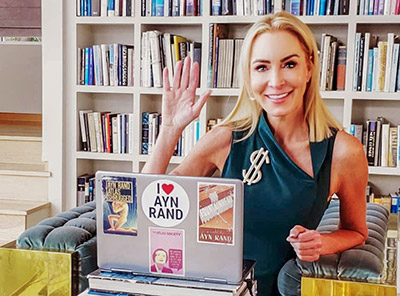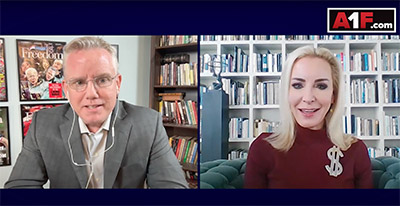
So many millions of young adults—and, for that matter, adults in general—have come across Ayn Rand’s 1957 novel Atlas Shrugged and peeked inside or, as often happens today, began listening to an audio version. And then, before they knew it, they were enthralled by its bold characters and individualist point of view.
Some have also opened Rand’s books because many in the mainstream media have taken so much delight in attacking Rand—often personally, as taking on her ideas regarding individualism is a heavy lift.
Others, like me, were simply handed Atlas Shrugged and The Fountainhead by their grandmother, as it is part of a canon of literature she wanted me to be exposed to when I was young.
This conversation with Jennifer A. Grossman (who goes by “JAG”), the CEO of The Atlas Society, is in these pages because, as a nonprofit espousing Rand’s philosophy, it is involved in the cultural struggle over our individual rights. Rand used fiction—and, though less-widely read, nonfiction—to unveil the importance of individual freedom to generations of people who largely weren’t being taught very much about the philosophic foundation of their individual rights. The Atlas Society is trying to continue this education.
 A1F: First, tell us about The Atlas Society and your mission there.
A1F: First, tell us about The Atlas Society and your mission there.
Grossman: One doesn’t need to be an Objectivist to recognize that Ayn Rand’s literature, for so many, has been the “gateway drug” to liberty. My old boss at the Cato Institute, Ed Crane, called Ayn Rand the all-time greatest recruiter for the liberty movement.
In the late 1970s, about 70% of young people in America were reading books every day just for fun. That percentage today is 12%. So, the trustees of The Atlas Society recruited me eight years ago to engage young people with the ideas that form the foundation of individual freedom. Ayn Rand herself said that art is the indispensable medium for the communication of the moral ideal, and that’s why we take a page from her playbook and use art to try to engage young people.
If you go into a high school library today, you’ll be shocked. It doesn’t look like the libraries that we grew up with. Almost all the books in them are now graphic novels. Seeing this, we recruited a Marvel Comics illustrator to create graphic novels for us that teach, through story, about the individual freedom Rand taught so well.
A1F: You recently wrote: “You can’t be objective if you don’t have perspective. The result of perspective-shrinking practices leaves us feeling embattled rather than empowered, despairing rather than determined, insular rather than eager and entrepreneurial.”
All true, of course, as that inward look is critical to personal growth. But, in regard to the Second Amendment, the mainstream media rarely gives their readers and viewers perspective with regard to this freedom. So, we are constantly battling ignorance and false sound bites from people who don’t have real perspective of this constitutionally protected right. What would an Objectivist say about breaking through to people who don’t understand their own freedom?
Grossman: First, all our other rights are meaningless unless we have the right to protect our lives and to protect our property. Rand talked about that in terms of those who would try to destroy our country from within. Such people are trying to disarm the citizenry, both intellectually and physically. This is why everything the NRA is doing is so very important.
And the NRA is now in a critical First Amendment fight. The U.S. Supreme Court will hear NRA v. Vullo. If the First Amendment rights of associations like the NRA can purposely be destroyed by government officials, then who will be silenced next?
This again makes it clear that fostering a free-speech culture is so critical. Some are now trying to shut down ideas they find offensive or dangerous. That never works. When you try to stigmatize, silence, suppress and de-platform those who have different views, what happens is you actually end up further polarizing society.
So, when it comes to getting the word out today about our freedom, one of the things that was most-striking to me when I came to run Atlas Society—this after almost 25 years of working at the Cato Institute—was just how little had changed with how think tanks promote their ideas. We’ve had a complete revolution in means of communication, but, too often, our think tanks have not kept up. The reason why some on the far Left continue to call for more censorship of those with the “wrong” views is they know their own ideas aren’t popular. They also know that freedom resonates, especially with the young. Classically liberal values of being able to speak freely and to protect oneself are still popular. It is important to find ways to have open discussions about this with young people.
There are many things wrong with TikTok and some of these platforms, but I think we need to use every single means at our disposal. At The Atlas Society, we’ve made a serious study of what 12-15 year olds are watching, with what kinds of content they’re engaging with. We use those places to communicate with them. I’d also say that finding a way to communicate in narrative form, as in with storytelling, is the most-effective method. Since the earliest days of Greek mythology, for example, stories have served as transmission vehicles for the communication of ideals.
So, I think finding ways to use animated videos, graphic novels, social media and humor are key to teaching the next generation about their freedom.

A1F: You are a Californian. And a Californian who shoots. How is it in your state these days?
Grossman: I live in Malibu in an isolated area on top of a cliff. I have friends who say, “Oh my goodness, don’t you feel unsafe?” Those are friends who usually aren’t NRA members. They don’t have guns and they don’t know how to use them. They don’t know how freeing it is to be able to protect yourself. Still, I have managed to find quite a few like-minded friends, even here in Southern California.
I have been a gun owner in California for so long that I don’t know firsthand what it is like to begin exercising this freedom now. But, as I seek further training, I have been really excited to learn more about all of the resources the NRA provides. I think, especially with what happened during 2020, it is more important than ever to know how to defend yourself.
On California, though, I’m not that optimistic. But, again, at some point, as Ayn Rand said, you can evade reality, but you can’t evade the consequences of evading reality.
A1F: How can people connect with you and The Atlas Society?
Grossman: They can find us on atlassociety.org. You can find Atlas Society on Twitter, LinkedIn and YouTube. And if you go to You-Tube, please check out our new four-minute book trailer. Everyone can always reach out to me at jag@atlassociety.org.

































